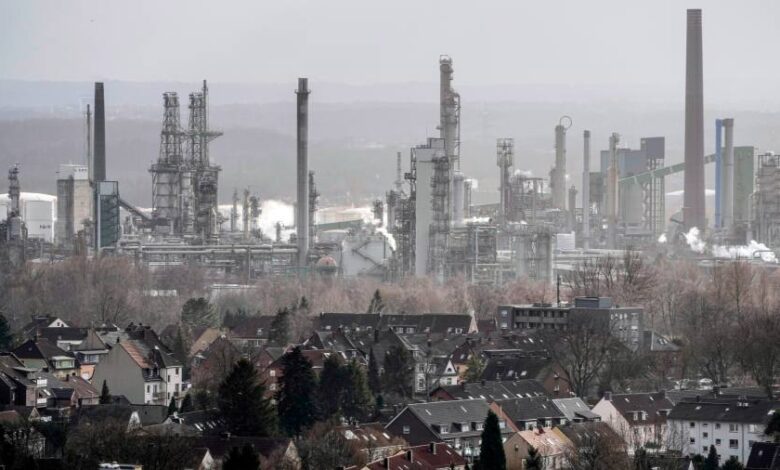Why EU cuts to red tape could hamper environmental ambitions

Good morning, and thanks for reading.
Today, our competition correspondent unpacks how a push to reduce (green?) red tape is great news for oil companies, and our Madrid bureau chief explains why the trains in Spain aren’t mainly on the plain.
Have a great long weekend, we’ll be back on Tuesday.
Green tape
Some EU officials worry that a push to cut red tape could let companies off the hook regarding their efforts to reach the Paris climate goals.
New draft rules seen by the Financial Times would make reporting on climate impacts voluntary rather than mandatory for EU companies, writes Alice Hancock.
Context: this year, an update of the bloc’s corporate reporting standards came into force, increasing the number of companies covered by the rules. It sets out that businesses have to report to a set of standards, which will be laid out in further legislation this year.
According to the draft of that legislation, companies won’t have to disclose efforts to come in line with the Paris climate agreement unless the company deems them “material” to its activities.
A specialist advisory group, EFRAG, had advised making reporting climate impacts mandatory, while others, such as employment conditions, could be submitted according to an assessment of their importance done by the company itself.
But the European Commission seems to have disregarded that advice and wants to make all areas, including climate, subject to a “materiality assessment”.
The change has prompted disquiet among more environmentally-minded officials. They argue that it will be more difficult to track the effect of businesses’ activities on the climate. Finance institutions would also have a harder time keeping tabs on businesses they invest in for their own financial reporting.
It also means that companies can set their own terms when it comes to decarbonisation, one EU official said, as seen at the ExxonMobil annual meeting last week.
The move is part of Brussels’ wider effort to cut red tape, after commission president Ursula von der Leyen promised to reduce reporting requirements for businesses by a quarter.
A document circulated this week by Denmark and Estonia showed that there was support among member states for the anti-bureaucracy push.
But in an ironic twist, the changes mean the work for companies might not actually decrease. An executive at a major multinational firm said that while there might be less actual reporting, “it will still take the same amount of work for us because we need to do the assessment for all”.
The commission declined to comment on the change. It said that the standards “will be published for public consultation as soon as possible”.
Chart du jour: Recession after all
The German economy contracted by 0.3 per cent in the first three months of this year, performing worse than the initial estimate of zero growth. The second consecutive quarter of gross domestic product contraction means Europe’s biggest economy is officially in a recession.
Derailed
Spain’s sunny coastal cities such as Barcelona, Valencia or Málaga make for a great holiday. But have you been to more than one of them on the same trip? Think twice about trying, writes Barney Jopson.
Context: Spain has one of the best high-speed train networks in Europe, but most rail lines emerge like spokes from the capital Madrid. Despite the Mediterranean being central for tourists, industry and agriculture, there is no speedy train connection between its cities.
That is a huge source of frustration for regional politicians who are in the spotlight ahead of regional and local elections on Sunday.
In Valencia, poised to be the most hotly contested race, one thing the candidates agree on is the need to build a “Mediterranean corridor”. A plan for a line into France has existed for years, but progress has been grindingly slow.
Ximo Puig, the regional president heading a Socialist-led coalition, blamed “the problem of Spanish centralism” for the lack of a high-speed link.
“Madrid is like a vacuum that sucks up resources,” he told the FT. “Everything has to go through the centre, when the Mediterranean corridor produces more than 50 per cent of all Spanish exports.”
The issue is a reminder that the devolution baked into the post-Franco constitution left plenty of things that only the central government decides. Bits of a Mediterranean corridor have been built, but delays are rife.
For now, the best transport option for goods ranging from cars to avocados is the road — or the sea. “It’s absurd,” said Puig.
Puig’s opponent, Carlos Mazón of the conservative People’s party, said the rail line “is an absolute priority piece of infrastructure”.
What to watch today
-
German chancellor Olaf Scholz meets leaders from Estonia, Lithuania and Latvia in Tallinn.
-
EU parliament president Roberta Metsola visits government officials in Austria.
Now read these
Get Best News and Web Services here

